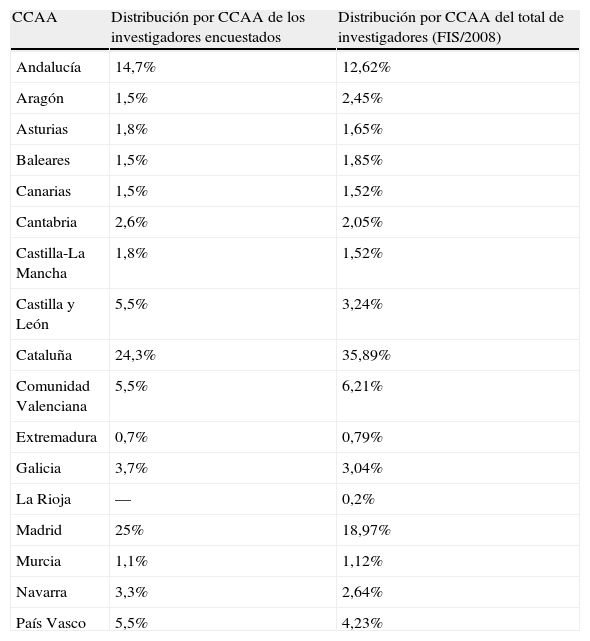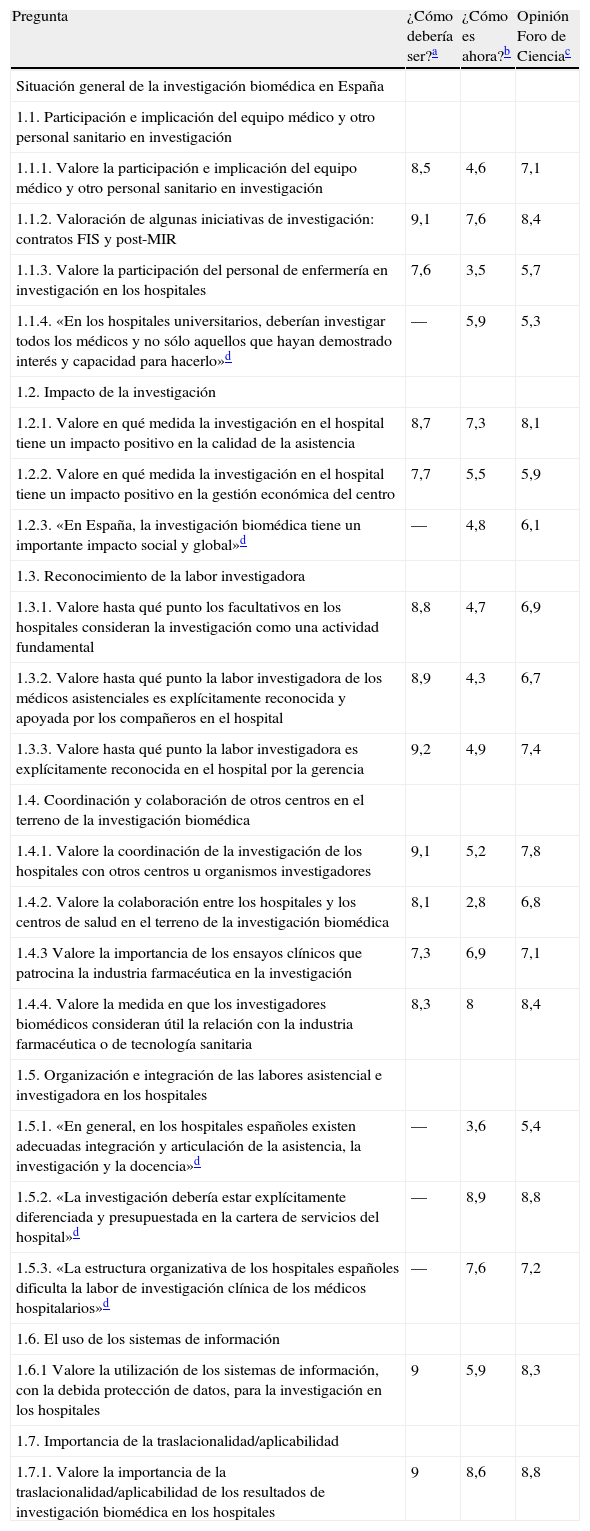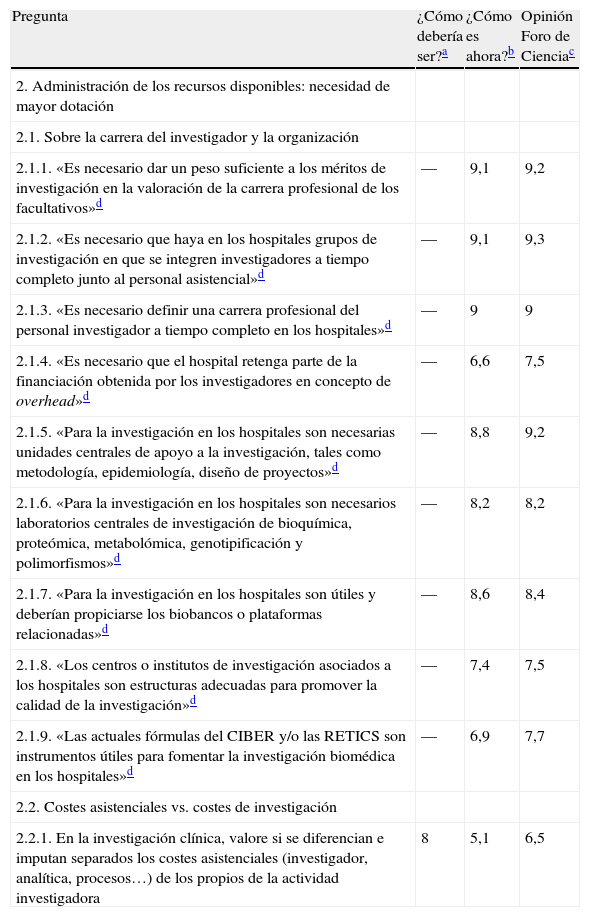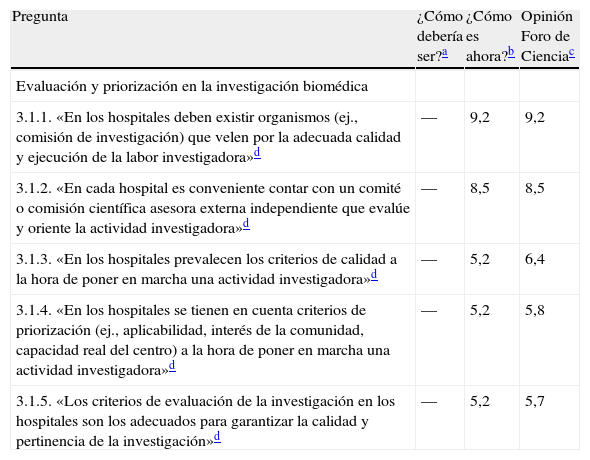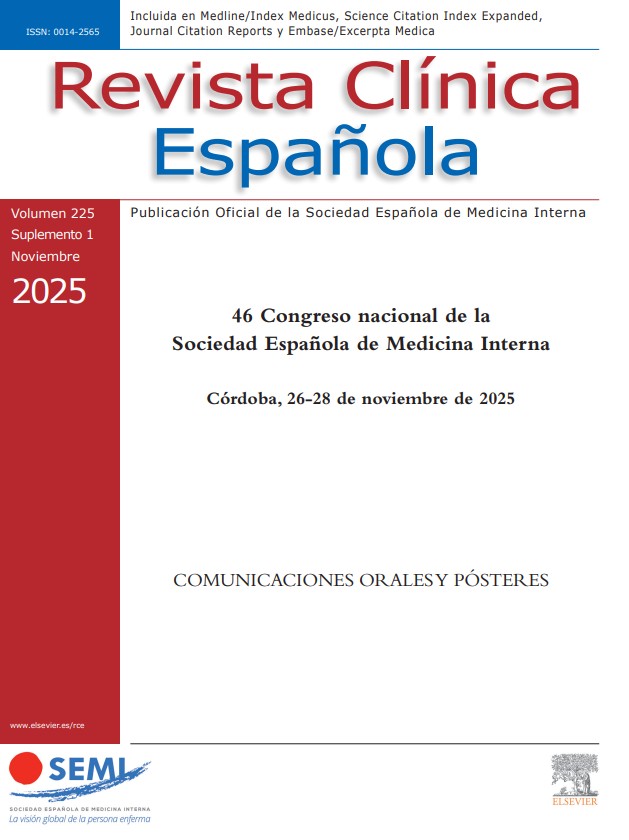No se ha realizado un estudio que analice cómo perciben y valoran los investigadores que trabajan en los hospitales españoles el sistema de investigación actual. Este trabajo, llevado a cabo por el Foro de Ciencia de la Fundación Lilly, tiene por finalidad mejorar el nivel de información sobre la actividad de investigación que se realiza en los hospitales.
Sujetos y métodosMediante entrevista «autoadministrada» compuesta de 34 ítems y dirigida a los médicos u otros facultativos investigadores que trabajan en hospitales españoles (272 encuestados), se analizaron tres cuestiones: a) situación general de la investigación biomédica en España; b) administración de los recursos disponibles: necesidad de mayor dotación, y c) evaluación y priorización en la investigación biomédica.
ResultadosLa explotación de los datos ha evidenciado fortalezas en el sistema como son las iniciativas para fomentar la investigación mediante contratos FIS y post-MIR (7,6/10 puntos); los efectos beneficiosos de la investigación en la calidad asistencial (7,3/10), o el apoyo de la industria farmacéutica con los ensayos clínicos que patrocina (6,9/10). Pero también ha puesto de manifiesto algunas debilidades en la organización de los centros como, por ejemplo, las referidas a la imputación diferenciada de los costes asistenciales de la actividad investigadora (5,1/10); a la coordinación entre ellos y los centros de salud (2,8/10), y a la integración y articulación entre asistencia, docencia e investigación (3,6/10). Asimismo ha detectado la necesidad de mejorar la priorización (5,2/10) y evaluación (5,2/10) de las actividades investigadoras, y de reconocer la investigación como actividad fundamental de los hospitales (4,7/10).
ConclusionesLos investigadores encuestados consideran que en las últimas décadas la investigación biomédica en el medio hospitalario ha mejorado notablemente, lo que ha redundado positivamente en el número de publicaciones. Para los sujetos encuestados, la investigación debe tener un mayor apoyo y reconocimiento institucional, y una orientación más traslacional, que ha de traducirse en una mayor calidad de vida de los ciudadanos y registro de patentes.
No study that analyzes how the investigators who work in the Spanish hospitals perceived and evaluate the current research system has been performed. This work, carried out by the Scientific Forum of the Lilly Foundation, aims to improve the level of information on the research activity performed in the hospitals.
Subjects and methodsBy means of a «self-administered» interview made up of 34 items and aimed at physicians and other research professionals who work in the Spanish hospitals (272 surveyed), 3 questions were analyzed: a) general situation of biomedical research in Spain; b) administration of available resources: need for better resources, and c) evaluation and giving priority to biomedical research.
ResultsThe use of the data has shown strengths in the system such as the initiatives to promote research through contracts with FIS and post-residency (7.6/10 points); the beneficial effects of research and care quality (7.3/10); or support of the pharmaceutical industry through the sponsoring of clinical trials (6.9/10). However, it has also shown that there are some weaknesses in the organization of the centers, as for example, those referring to the differentiated allocation of the care cost of the research activity (5.1/10); to the coordination between them and the health care centers (2.8/10); to the integration and organization among care, teaching and research (3.6/10); and to decide the priorities (5.2/10) and evaluation (5.2/10) of the research activities. Furthermore, the value of the research as a fundamental activity of the hospitals is emphasized (4.7/10).
ConclusionsThe investigators surveyed consider that biomedical research in recent decades in the hospital setting has significantly improved and has had a positive effect in the number of publications. The subjects surveyed consider that research should have greater institutional support and recognition, and a more translational orientation, which would be translated into better quality of life of the citizens and registry of patents.
Artículo
Diríjase desde aquí a la web de la >>>FESEMI<<< e inicie sesión mediante el formulario que se encuentra en la barra superior, pulsando sobre el candado.

Una vez autentificado, en la misma web de FESEMI, en el menú superior, elija la opción deseada.

>>>FESEMI<<<



